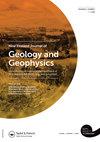新西兰奥塔哥Rise and Shine剪切带中金和砷的地表再分布
IF 1.9
4区 地球科学
Q1 GEOLOGY
New Zealand Journal of Geology and Geophysics
Pub Date : 2021-11-08
DOI:10.1080/00288306.2021.1996402
引用次数: 2
摘要
历史悠久的Come-In-Time金矿发育在奥塔哥片岩长bbbb70 km的造山带和Shine剪切带中~ 100*100 m的区域。在区域性中新世不整合之下,热液铁白云石和含金毒砂以及含黄铁矿的奥塔哥片岩的氧化作用导致硫化物和铁白云石被含砷(As)的氧化铁取代。含砷氧化铁主要集中在原矿化部位,特别是剪切体及其附近,但矿化后节理和断裂的活动使砷在米尺度上重新分布。金在氧化过程中从硫化物中释放出来,并通过表生氧化过程聚集成数量较少的较大颗粒(毫米级),这些颗粒与含砷氧化铁密切共生,特别是在剪切过程中。近端未成熟碎屑中的残积金包括从附近侵蚀而来的变圆的表生颗粒,以及从先前上覆的中新世沉积物中外源的碎屑薄片。一些残积金被露头上的地衣困在细小的沉积物中。因此,通过在米尺度上氧化岩石,热液中砷和金的关系得到了广泛的维持,但在地表环境中,金的浓度在局部得到了增强。本文章由计算机程序翻译,如有差异,请以英文原文为准。
Surficial redistribution of gold and arsenic from the Rise and Shine Shear Zone, Otago, New Zealand
ABSTRACT
The historic Come-In-Time gold mine was developed in a ∼100*100 m area of the >7 km long orogenic Rise and Shine Shear Zone in Otago Schist. The oxidation of hydrothermal ankeritic and auriferous arsenopyrite and pyrite-bearing Otago Schist beneath a regional Miocene unconformity resulted in replacement of sulphides and ankerite by arsenic (As)-bearing ferric oxyhydroxide. The As-bearing ferric oxyhydroxide is mainly concentrated in and near the original mineralisation sites, especially shears, but mobilisation into post-mineralisation joints and fractures has redistributed As on a metre scale. Gold was liberated from sulphides during oxidation and aggregated by supergene oxidation processes into a smaller number of larger particles (mm scale) that are intimately intergrown with As-bearing ferric oxyhydroxide, especially in shears. Eluvial gold in proximal immature debris includes variably rounded supergene particles eroded from nearby, and some externally derived detrital flakes from previously overlying Miocene sediments. Some eluvial gold is trapped in fine sediments by lichen on outcrops. The hydrothermal As-Au relationship has therefore been broadly maintained through oxidation of rocks at the metre scale but Au concentrations have been locally enhanced in the surficial environment.
求助全文
通过发布文献求助,成功后即可免费获取论文全文。
去求助
来源期刊
CiteScore
5.10
自引率
27.30%
发文量
34
审稿时长
>12 weeks
期刊介绍:
Aims: New Zealand is well respected for its growing research activity in the geosciences, particularly in circum-Pacific earth science. The New Zealand Journal of Geology and Geophysics plays an important role in disseminating field-based, experimental, and theoretical research to geoscientists with interests both within and beyond the circum-Pacific. Scope of submissions: The New Zealand Journal of Geology and Geophysics publishes original research papers, review papers, short communications and letters. We welcome submissions on all aspects of the earth sciences relevant to New Zealand, the Pacific Rim, and Antarctica. The subject matter includes geology, geophysics, physical geography and pedology.

 求助内容:
求助内容: 应助结果提醒方式:
应助结果提醒方式:


